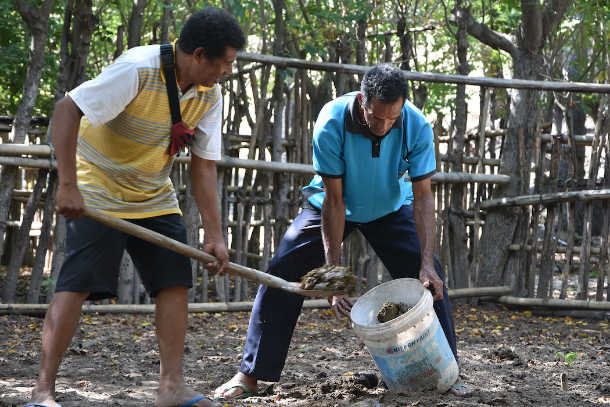
Baldinus Ndoi (right) and a colleague collect animal waste to be used for biogas production in Waelangga in Indonesia’s East Nusa Tenggara province on May 30. (Photo by Markus Makur)
Father Robertus Pelita found out about biogas in 2007 while serving as rector of St. John Paul II Minor Seminary in Labuan Bajo in Indonesia’s predominantly Catholic East Nusa Tenggara province.
“A fellow priest from Java came to visit me. He told me about developing alternative energy by utilizing biogas, particularly for cooking,” he said.
His interest aroused, Father Pelita began gathering more information on alternative energy from the internet and media reports. His research paid off and in just two years he was producing biogas.
“It worked well,” said the priest, who was in charge of the minor seminary from 2007 until 2016.
The source of the gas came from human waste that was converted into fuel by using domestic biodigesters crafted from old oil drums.
Domestic biodigesters are simple devices that make small but valuable quantities of biogas through the decomposition of organic waste.
When organic matter, such as food, human excrement and animal waste, break down in an anaerobic environment — an environment absent of oxygen — they release gases, primarily methane and carbon dioxide.
Due to the high content of methane in biogas, it is flammable, producing a deep blue flame that can be used as an energy source.
“When cooking at the minor seminary, they have used biogas since then,” said the priest, who went on to serve as episcopal vicar of Ruteng Diocese in the province’s Manggarai district, from 2016 until 2019.
Introduction to biogas
Since being elected chairman of the diocese’s Socio-Economic Development Commission in January this year, Father Pelita has seen more opportunities to introduce biogas to lay Catholics in the diocese, which serves Manggarai, East Manggarai and West Manggarai districts.
Firstly, the 50-year-old priest in March installed biodigesters in the diocese’s gardens in Leda, a village in Manggarai district, and in Mano in East Manggarai, with animal waste as the main source.
“There were then requests from several parishes, including Holy Spirit Church in Labuan Bajo in West Manggarai and St. Arnold Janssen Church in Waelangga in East Manggarai district,” he said.
Many lay Catholics and religious women have asked him to help develop biogas sourced from animal waste at their homes and convents.
“For one biodigester, we need at least four pigs,” he said, adding that most lay Catholics from all 86 parishes in the diocese raise animals like pigs, cows, buffaloes, goats and horses, which give them the means to produce biogas.
The next step was to train biogas trainers in biogas production in cooperation with other diocesan commissions. The diocese’s pastoral center director, Father Marthen Chen, coordinated the training of parish officials, also in March.
The training bore fruit with at least three biodigesters being successfully constructed and installed in April and May. “In the near future, biodigesters will be installed in all parishes,” Father Pelita said.

Father Robertus Pelita (white shirt) gives a biogas production class to Catholics in Leda in Indonesia’s East Nusa Tenggara province on March 10. (Photo by Markus Makur)
Environmental preservation
Local church officials say what the priest has done so far has closely followed the diocese’s mission, which is to preserve the environment.
The diocese has a track record of promoting environment-friendly programs, such as developing organic horticulture to produce organic vegetables and fruit, which are then sold to many restaurants.
“Biogas production can reduce dependence on firewood, kerosene and natural gas for household use among about 700,000 Catholics in this diocese,” said Father Chen said, who added that those already producing biogas are saving a great deal of money in fuel costs.
Father Gotfridus Sisilianus Angkur from St. Arnold Janssen Parish in Waelangge village said biogas production can also help reduce global warming. “As such, this diocese needs to encourage its people to produce biogas,” he said.
Baldinus Ndoi, a local Catholic who underwent a biogas training program, says Father Pelita’s deserves recognition for his initiative.
“He presented the whole concept in a very interesting way. He didn’t only share with us the theory about biogas production but also showed us how to produce it,” he said.
“We call him the biogas priest from Ruteng Diocese.”


